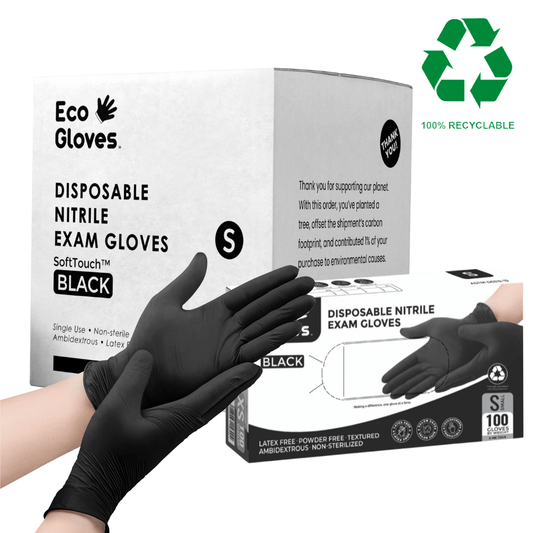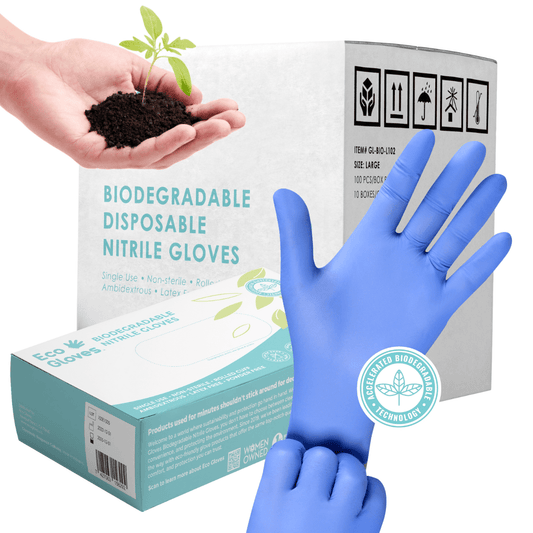A Guide to Disposable Gloves for the Workplace
Eco GlovesWearing gloves in the workplace is an important safety measure that all workers and a business should consider. There are many potential hazards that can be encountered on the job, and gloves can provide a barrier between a worker and these hazards. In many places, wearing gloves is not just a recommendation, but a requirement. In this guide, we'll explore the specific regulations or requirements for workplace gloves, the benefits of wearing gloves, the various types of gloves available for each workplace setting, and the specific situations in which they should be worn.
Topics Covered
- Regulations and Standards for Workplace Gloves
- Benefits of Wearing Gloves in the Workplace
- Types of Gloves by Industry
- Factors to Consider When Choosing Gloves
- Purchase Workplace Gloves For your Business
- Key Takeaways: Workplace Disposable Gloves
-
Frequently Asked Questions About Workplace Gloves: Safety, Compliance, and Sustainability
Regulations and Standards for Workplace Gloves
Several regulations and standards require the use of gloves in the workplace to ensure the safety and health of workers. In the United States, the Occupational Safety and Health Administration (OSHA) sets standards for the use of personal protective equipment (PPE), including gloves, in various industries. OSHA requires employers to provide appropriate PPE, including gloves, to employees and ensure that they are used properly. Employers must also conduct a hazard assessment to determine the types of gloves required based on the specific job tasks and potential hazards present.
In the healthcare industry, the Centers for Disease Control and Prevention (CDC) recommends the use of gloves to prevent the spread of infectious diseases. The Food and Drug Administration (FDA) also sets standards for gloves used in food handling and processing to ensure they are safe and meet food safety regulations.
In the European Union, the Personal Protective Equipment (PPE) Regulation 2016/425 establishes standards for the design, manufacture, and use of PPE, including gloves. The regulation requires that gloves be CE marked to show compliance with European safety standards.
Benefits of Wearing Gloves in the Workplace
Wearing gloves in the workplace has numerous benefits, including protecting workers' hands from injuries and exposure to hazardous substances. Gloves act as a barrier against cuts, punctures, abrasions, and chemicals, preventing skin damage and reducing the risk of infections. They also promote hygiene and food safety in industries such as healthcare, food service, and janitorial services, by preventing cross-contamination between different surfaces and food items. Gloves enhance workers' grip and dexterity, allowing them to perform tasks with greater ease and efficiency. Wearing gloves can also help to reduce the risk of hand fatigue, which can be caused by repetitive tasks or gripping objects for extended periods of time. Overall, wearing gloves is an important safety measure that helps to reduce the risk of workplace injuries and illnesses and promotes a safe, efficient, and healthy working environment.
Types of Gloves by Industry
Gloves are an essential safety measure in industries such as healthcare, food service, chemical manufacturing, construction, and many more. There are many different types of gloves available for use in the workplace, each designed to protect against specific hazards. Selecting the appropriate gloves can significantly reduce the risk of hand injuries and ensure a safe working environment.

Manufacturing and Construction Gloves
In manufacturing and construction industries, gloves are an essential component of personal protective equipment (PPE). They protect workers' hands from various hazards, including cuts, punctures, abrasions, chemicals, and heat. However, not all gloves are suitable for all types of work environments. The gloves must be carefully selected based on the specific job tasks and potential hazards present. For example, cut-resistant gloves are made from materials such as Kevlar or steel wire and are ideal for use in environments where sharp objects are present. Heat-resistant gloves, on the other hand, are made from materials such as aluminized fabric or silicone and are designed to protect against high temperatures. Both of these glove types are ideal for manufacturing and construction tasks.
Healthcare Disposable Gloves
In addition to protecting against physical hazards, gloves can also help to prevent the transmission of germs and illnesses. This is especially important in the healthcare industry, where workers are at a higher risk of exposure to bloodborne pathogens and other infectious diseases. Latex gloves, for example, are a common choice in the medical field because they provide a barrier against these types of hazards.
There are also gloves available that provide protection against chemical hazards. These gloves are made from materials such as neoprene or nitrile, which are resistant to a wide range of chemicals. It is important to choose the right type of chemical-resistant glove for the specific chemicals being handled, as different materials have varying levels of resistance.
Foodservice Disposable Gloves
In the food service industry, gloves are a crucial component of food safety and hygiene. They protect food from contamination by human hands, hair, and skin, as well as prevent the spread of pathogens from one food item to another. Different types of gloves are required for food handling, depending on the specific tasks and types of food being handled.
Disposable gloves made of nitrile, vinyl, or latex are commonly used in food handling. Nitrile gloves are the most popular choice as they are durable, resistant to chemicals and punctures, and offer excellent tactile sensitivity. Vinyl gloves are less expensive and offer a looser fit, while latex gloves provide superior elasticity and comfort. However, latex gloves can cause allergic reactions in some people, and hence their use is discouraged.
Food service workers also need gloves that comply with food safety regulations. These gloves must be food-grade and approved by the Food and Drug Administration (FDA). Additionally, gloves should be changed frequently, especially when handling different types of food, to avoid cross-contamination. Regular handwashing and sanitizing should also be practiced, even when gloves are worn.
Cleaning and Janitorial Maintenance Disposable Gloves
Janitorial cleaning and maintenance involve a wide range of tasks, including handling cleaning chemicals, scrubbing floors, and disinfecting surfaces. Therefore, gloves are an essential part of personal protective equipment (PPE) for janitorial workers. Different types of gloves are needed, depending on the specific cleaning tasks.
For handling chemicals, workers need gloves made of nitrile, neoprene, or butyl rubber, which are resistant to chemicals and provide excellent barrier protection. For tasks that involve scrubbing or abrasive materials, gloves made of PVC or rubber offer excellent durability and resistance to punctures and abrasions. Workers also need gloves with textured surfaces to improve grip and reduce the risk of slips and falls.
It is important to note that janitorial workers must select gloves that fit properly and offer adequate protection for the task at hand. Gloves must also be changed frequently to prevent the spread of germs and bacteria. Regular handwashing and sanitizing should also be practiced, even when gloves are worn. Overall, the right gloves can protect janitorial workers from hazards and promote a safe working environment.
Dental Disposable Gloves
In a dental office, gloves are a critical component of personal protective equipment (PPE) to protect dental professionals and patients from infection and cross-contamination. Dental workers need gloves that provide excellent barrier protection and tactile sensitivity to perform delicate tasks. Nitrile gloves are the most commonly used gloves in dental offices due to their excellent barrier protection against blood-borne pathogens and chemicals. Nitrile gloves are also suitable for people with latex allergies.
For some dental procedures that require more tactile sensitivity, such as restorative dentistry or orthodontics, dental professionals may opt for thinner gloves made of latex or vinyl. Latex gloves provide excellent tactile sensitivity and flexibility, while vinyl gloves offer good protection against chemicals and are suitable for people with latex allergies. Dental professionals must choose gloves that fit properly and are changed frequently to prevent cross-contamination and the spread of infection. Overall, the right gloves can help dental professionals maintain a safe and hygienic working environment while providing excellent patient care.
Factors to Consider When Choosing Gloves
Choosing the right gloves for a specific job or task is crucial in ensuring workers' safety and preventing injuries. Below are some of the factors you should consider when choosing gloves:
Glove Size
An important consideration when choosing gloves for the workplace is size. It is essential that the gloves fit properly in order to provide the necessary level of protection. Gloves that are too small may not cover the entire hand and wrist, leaving some areas vulnerable to hazards. On the other hand, gloves that are too large may be difficult to manipulate and could interfere with the worker's ability to perform their tasks.
Requirements of the Job (Textured Fingertips or Long Cuffs?)
In addition to the type and size of gloves, it is also important to consider the specific requirements of the job when selecting gloves. Some jobs may require gloves with special features, such as gloves with textured fingertips for improved grip or gloves with extended cuffs for additional wrist protection. It is also important to follow any industry-specific regulations or guidelines when it comes to the use of gloves on the job.
Correct Use of Gloves to Prevent Contamination
While wearing gloves can provide many benefits in the workplace, it is important to use them correctly in order to maximize their effectiveness. This includes properly putting on and removing the gloves to avoid contamination. It is also important to follow the manufacturer's instructions for care and maintenance, as gloves that are not properly cared for may not provide the level of protection they were designed for.

Disposable Gloves Allergy Concerns
When selecting gloves for the workplace, it is essential to consider allergy concerns, especially when choosing gloves for a healthcare, medical, or foodservice setting. Latex allergies can cause severe reactions in some individuals, including hives, itching, and difficulty breathing. Therefore, it is essential to assess the potential risk of allergic reactions to gloves and choose an alternative material if necessary. Nitrile gloves are a suitable alternative for people with latex allergies, as they provide similar performance and protection to latex gloves without causing allergic reactions. Vinyl gloves are also a good alternative for people with latex allergies, but they offer less durability and protection than nitrile or latex gloves. Overall, employers and workers must consider allergy concerns when selecting gloves to ensure the safety and well-being of all employees.
Purchase Workplace Gloves For your Business
In conclusion, wearing gloves in the workplace is an essential safety measure that can significantly reduce the risk of workplace injuries and illnesses. Many local country and state regulations provide a criteria for appropriate glove use to support this very matter. Selecting the right type of glove for a job and using them correctly is an important to ensure the health and wellness of workers and patrons alike. By taking the precautions outlined here, can help to ensure safety for their workers and patrons as well as potential damage to their business name.
Got questions or need assistance on finding the right gloves for your business or workplace? Contact us here. We'd love to hear from you!
Key Takeaways: Workplace Disposable Gloves
- Wearing gloves in the workplace helps prevent injuries, chemical exposure, and cross-contamination across multiple industries.
- OSHA, FDA, CDC, and international standards (e.g., CE marking in the EU) outline regulations for glove use and safety compliance.
- Different industries require specific glove types—nitrile for chemical resistance, latex for elasticity, vinyl for affordability, and specialty gloves for cut or heat protection.
- Proper glove size, fit, and special features (e.g., textured fingertips, extended cuffs) improve safety, comfort, and performance.
- Powder-free and latex-free options help reduce allergy risks in healthcare, food service, and other sensitive environments.
- Correct glove use—including frequent changing and proper donning/removal—is essential for maintaining hygiene and protection.
👉 Shop Eco Gloves’ workplace-ready glove collection to protect your team while supporting sustainable business practices.
Frequently Asked Questions About Workplace Gloves: Safety, Compliance, and Sustainability
1. What workplace regulations govern glove use?
In the U.S., OSHA sets PPE standards, the FDA regulates food handling gloves, and the CDC issues healthcare guidelines. In the EU, PPE Regulation 2016/425 requires CE-marked gloves.
2. Which glove type is most versatile for workplace use?
Nitrile gloves are highly versatile, offering chemical resistance, durability, and latex-free protection.
3. How do I choose the right glove for my industry?
Match glove material and features to your hazards—nitrile for chemicals, Kevlar for cuts, heat-resistant materials for high temperatures, and food-grade gloves for food handling.
4. How often should workplace gloves be changed?
Change gloves after contamination, switching between tasks, or when damaged—this is especially critical in food service and healthcare.
5. Are eco-friendly gloves available for workplace settings?
Yes. Eco Gloves offers biodegradable nitrile and compostable gloves suitable for multiple industries.
















